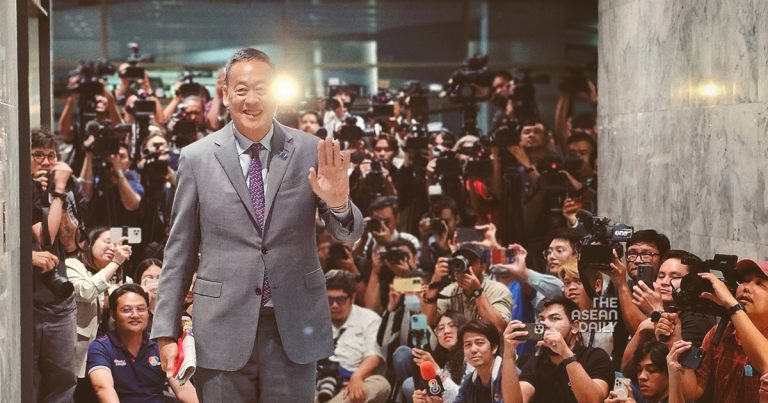25-8-2023 (BANGKOK) A casual observer of Thai politics awakening after 15 years would be mistaken to think nothing had changed. Former prime minister and Pheu Thai founder Thaksin Shinawatra returned to a hero’s welcome in Bangkok, with his party once again leading the government. However, the surface similarities with Thaksin’s 2008 homecoming end there. Much has transpired in the intervening years, culminating in a new political landscape following Tuesday’s parliamentary vote.
On the surface, Pheu Thai’s candidate Srettha Thavisin secured the prime ministership with 482 votes, surpassing the required 375. In contrast, initial hopeful Pita Limjaroenrat of the Move Forward Party (MFP) fell short with only 324 votes last month. However, the decisive factor was the military-appointed Senate, which overwhelmingly blocked Pita but saw nearly two-thirds support Srettha. This support came at a heavy political price for Pheu Thai.
Needing the Senate’s backing, Pheu Thai abandoned the reformist MFP and aligned with the pro-military Palang Pracharath and Prime Minister Prayut Chan-o-cha’s United Thai Nation parties. This fueled speculation of a deal to help Thaksin return from self-exile, having faced criminal convictions in absentia. While Srettha is independently minded, he now leads a numerically imbalanced coalition. Pheu Thai holds 141 seats compared to 157 for its more conservative partners. Legislative success will require maintaining fragile consensus across ideological divides.
Cabinet positions may reflect this dynamic, with Pheu Thai focusing on economics through ministries like Finance but acceding to others’ demands. Bhumjaithai, the first to join the coalition, may lead Transport and Health. Pro-military parties could control Defence, Interior, plus Digital Economy and Education to reassure conservatives. Most crucially, Justice oversees the prison system detaining Thaksin; conveying his safety while avoiding fresh cases that could extend his sentence becomes a minefield.
While some predicted Srettha may ease Thaksin’s situation, agitating now risks destabilizing the fledgling arrangement. Immediate challenges include lifting the economy amid public disillusionment without enthusiasm for military-backed parties. Long term, Pheu Thai must rehabilitate progressive support lost through abandoning the MFP and reviving Thaksin’s influence to combat their emergence as the true democratic option by 2028. Balancing all factions leaves little room for error in the intervening years if hopes for stable civilian leadership are to be realized.
Behind closed doors, negotiations established the architecture of this nascent détente between long-feuding factions. However, reconciliation will prove an ongoing process, as maintaining cooperation across such ideological divides within an unwieldy governing coalition remains an immense challenge. All players must now perform a high-wire act to keep fragile compromises from fracturing under internal or external pressures. The conservative bloc understandably eyes Pheu Thai’s intentions warily, while progressives view their defections with resentment.
For Srettha personally, balancing competing agendas leaves slim room for independent policy-making. He faces governing through consensus rather than ambition, lest missteps provide pretexts for unwinding this unprecedented partnership. If stability results, it may only be by deferring deeper reforms and postponing resolution of the issues dividing Thai society. Time will tell if such an arrangement satisfies any side or merely stores up new grievances. Ultimately, most observe less a new dawn than an unstable truce following years of power struggles, with the deepest conflicts yet to be addressed.
Thaksin’s ultimate fate also remains undecided. While public attention focuses on the new coalition’s stability, his personal future drives greater long-term consequences. Having reasserted his enduring influence, momentum may build to rehabilitate Thailand’s once ascendant but still polarizing politician. How his case proceeds reveals whether reconciliation means recognising past injustices or retaining the status quo. Should economic recovery take hold, more feasibly addressing Thaksin’s situation could re-emerge as Pheu Thai’s gambit to strengthen its fragile authority. How such dynamics play out will shape Thai democracy’s direction for years to come.
For now, all sides invest carefully in maintaining a balance none may find ideal, but which at least postpones further destructive conflict. Yet preventing renewed escalation demands more than an armistice, requiring good faith on resolving the root issues that have divided Thai society for over a decade. Whether the complex compromises forging this new political dispensation can achieve even that begins the true test of a troubled democratic evolution. The stability of civilian rule hangs in the balance.




